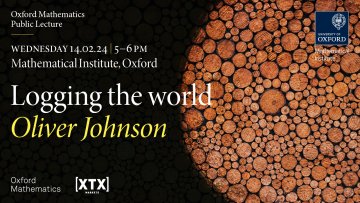During the pandemic, you may have seen graphs of data plotted on strange-looking (logarithmic) scales. Oliver will explain some of the basics and history of logarithms, and show why they are a natural tool to represent numbers ranging from COVID data to Instagram followers. In fact, we’ll see how logarithms can even help us understand information itself in a mathematical way.
16:00
3 Minute Thesis competition
Abstract
16:00
Creating Impact for Maths Research via Consulting, Licensing and Spinouts
Abstract
Oxford University Innovation, the University’s commercialisation team, will explain the support they can give to Maths researchers who want to generate commercial impact from their work and expertise. In addition to an overview of consulting, this talk will explain how mathematical techniques and software can be protected and commercialised.
16:00
Graduate Jobs in finance and the recruitment process
Abstract
Join us for a session with Keith Macksoud, Executive Director at global recruitment consultant Options Group in London and who previously has > 20 years’ experience in Prime Brokerage Sales at Morgan Stanley, Citi, and Deutsche Bank. Keith will discuss the recruitment process for financial institutions, and how to increase your chances of a successful application.
Keith will detail his finance background in Prime Brokerage and provide students with an exclusive look behind the scenes of executive search and strategic consulting firm Options Group. We will look at what Options Group does, how executive search firms work and the Firm’s 30-year track record of placing individuals at many of the industries’ largest and most successful global investment banks, investment managers and other financial services-related organisations.
About Options Group
Options Group is a leading global executive search and strategic consulting firm specializing in financial services including capital markets, global markets, alternative investments, hedge funds, and private banking/wealth management.
Short- and late-time behaviours of Fokker-Planck equations for heterogeneous diffusions
Abstract
The Fokker-Planck equation is one of the major tools of statistical physics in the description of stochastic processes, with numerous applications in physics, chemistry and biology. In the case of heterogeneous diffusions, the formulation of the equation depends on the choice of the discretization of the stochastic integral in the underlying Langevin-equation due to the multiplicative noise. In the Fokker-Planck equation, the choice of discretization then enters as a parameter in the definition of drift and diffusion terms. I show how both short- and long-time limits are affected by this choice. In the long-time limit, the existence of normalizable probability distribution functions is not always guaranteed which can be remedied by invoking elements of infinite ergodic theory.
[1] S. Giordano, F. Cleri, R. Blossey, Phys Rev E 107, 044111 (2023)
[2] T. Dupont, S. Giordano, F. Cleri, R. Blossey, arXiv:2401.01765 (2024)


